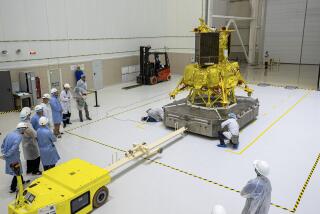Russian mice, gerbils dead in 30-day space ordeal; lizards live

- Share via
A crew of Mongolian gerbils may have gone where no Mongolian gerbil has gone before, but they did not come back alive. A Russian spacecraft filled with mice, lizards and other animals has returned to Earth -- but with the majority of its furred passengers apparently dead.
The Bion-M experiment, launched from Baikonur, Kazakhstan, on April 19, carried 45 mice, 15 geckos, 18 Mongolian gerbils, 20 snails and a number of different plants, seeds and microorganisms, according to a Russian state news site.
About half of the mice died, but the lizards reportedly survived. The Mongolian gerbils all expired, apparently due to an equipment failure, said Vladimir Sychev of the Russian Academy of Sciences, according to AFP.
The satellite was sent into a near-Earth orbit some 357 miles above Earth, far higher than the International Space station. Lasting 30 days, the mission represented the longest time that Russian animal astronauts had been sent into space. A previous mission in 2007 lasted 12 days and only went up to about 174 miles in altitude.
Perhaps ironically, the ill-fated Mongolian gerbils were thought to have an advantage in space, since the rodents live in harsh environments and can survive without water for relatively long periods, according to an agency release weeks before the launch. Half the mice were expected to die during the journey, according to Sychev.
Although many of the animals died, they will still provide the researchers with valuable science: Each animal was numbered and implanted with a tiny microchip that would contain the “entire biography of the animal,” according to an agency Web page.
Follow me on Twitter @aminawrite.







